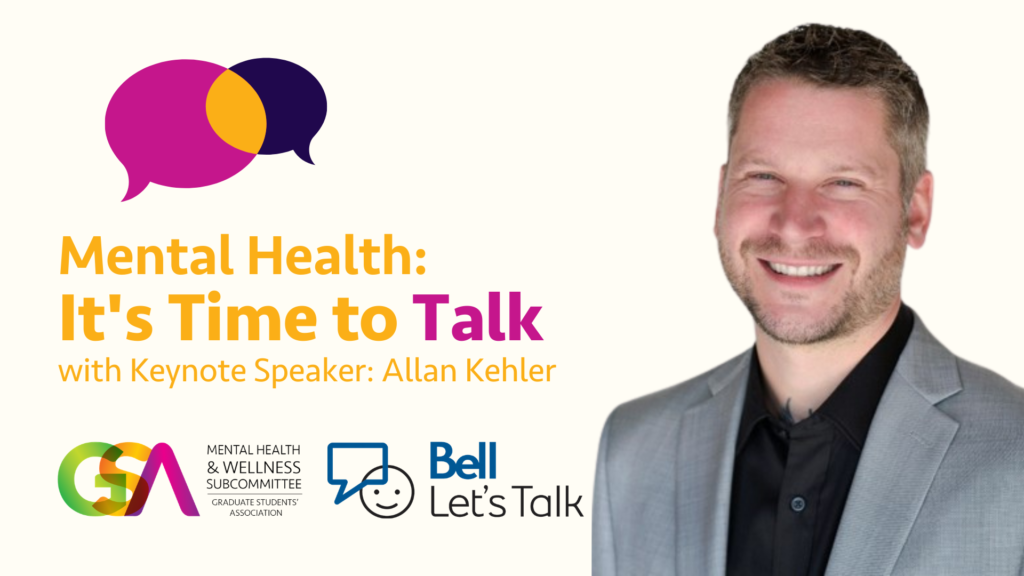By the GSA Mental Health and Wellness Subcommittee
One in five Canadians may experience a mental health problem in their lifetime (1). The COVID-19 pandemic has affected the mental health and wellbeing of persons around the globe and across all age demographics (2,3,4). The changes in routine and daily life as a result of the pandemic restrictions has resulted in an increase in social isolation, stress, anxiety, and depression for many individuals, especially in youth (2,3,4). Accordingly, mental health awareness and prevention is paramount in these unprecedented times.
University of Calgary and affiliated faculties, departments, and student organizations have worked tirelessly to adapt to the current climate and have adopted and modified programming to support students, staff, and faculty. Specific to graduate students, the Mental Health and Wellness Subcommittee (MHWS) is a ratified student-led organization within the Graduate Students’ Association and its mission is to address gaps in mental health support and education for graduate students. The MHWS aims to create a compassionate post-secondary environment in which students are provided resources to support their mental health and feel comfortable seeking support for their mental health and well-being. As part of this mission, the MHWS has hosted educational sessions with speakers from University of Calgary and community partners. The MHWS is committed to raising awareness of mental health conditions and the impact of conditions on graduate students, destigmatizing talking about mental health and accessing mental health supports, and promoting positive mental health behaviours. As part of this commitment, the MHWS continues to participate in events, such as Bell Let’s Talk, that provide graduate students with opportunities to learn from others with lived experiences, learn how to access supports and resources, and to take positive action in mental health and wellness.
Over the month of December 2020 and January 2021, the MHWS launched a survey asking UCalgary graduate students about their thoughts on mental health, mental health awareness campaigns/initiatives, and what they did to take care of their mental health. The survey responses reflected the variations in experiences students have had with mental health. Some participants, most of whom identified they were struggling with their mental, elected not to share their mental health struggles. However, some highlights included feelings of isolation, maladaptive coping mechanisms (e.g., alcohol), and feelings of despair. Student responses to some of the survey questions are highlighted below.
What do you do to promote your mental health?
- I do sports, go on walks, stay in touch with friends/family, cook delicious food, take a self-care day if needed, sleep enough, practice meditation and self-compassion.
- I started working out and giving myself “me time” in the mornings for half an hour before I start my workday.
- Exercise, eat healthy, connect with my circle, sleep well, drink enough water, pray, meditate, take care of myself and my space.
What do you wish people knew about mental health?
- Even though you smile, doesn’t always mean you are okay on the inside.
- I wish people knew that mental health is just as important as physical health. Your physical health and mental health have a huge impact on one another.
- That you are not alone in your struggles.
- How widespread mental health issues actually are (especially amongst grad students).
What about mental health campaigns like Bell Let’s Talk are (not) important?
- Campaigns bring an issue to surface but only by paying lip service – they don’t do as much to bring awareness to how mental health issues can also be ignored by the person experiencing them.
- It opens the conversation and attempts the fix the stigma around having mental health issues, which can be due to a vast number of reasons.
What else would you like to share about mental health?
- It is COMPLETELY normal and common to experience mental health difficulties. You don’t need to have a “valid” reason to feel depressed or anxious – some people feel down after going through difficult events, others feel down and aren’t sure why. Your feelings are always valid, regardless of whether you know why you have them. Seeing a therapist when you’re struggling is like seeing a doctor when you’re sick – everyone should do it!”
- Being locked in a basement for 9 months with the only socialization being through a webcam definitely negatively affects mental health.
If you require support:
If you are in crisis, please call 911 (24/7)
If you have urgent mental health needs, please call the Distress Centre 403.266.4357 (24/7)
If you are seeking additional information, please call Alberta Health Services Mental Health Helpline 1-877-303-2642 (24/7)
Campaigns like Bell Let’s Talk Day (January 28, 2021) and resources like the Campus Mental Health Strategy serve as opportunities to start conversations around mental health and wellness and connect students with supports available. This year, the MHWS is proud to host Allan Kehler, one of Canada’s most sought-after speakers for mental health and wellness. Allan Kehler has stood on more than 500 stages and is recognized for his dynamic and captivating approach. Having persevered through his own mental health issues and substance use, Allan Kehler will share his personal story and the valuable life lessons that have guided him on an incredible path of success. Allan is a renowned mental health advocate. A former teacher, Kehler now focuses his time speaking and writing on diverse topics related to mental health. He is the bestselling author of four books and his writing has been featured in numerous national magazines.
The Mental Health and Wellness Subcommittee invite all University of Calgary graduate students, undergraduate students, faculty, and staff to join us in welcoming Allan on January 28, 2021 at 5pm!

The event will be held virtually (Zoom) on January 28, 2021 5-6:30pm. Registration is open on the GSA website and Zoom information will be sent to all email addresses following registration.
For more information on Allan Kehler please visit: https://www.allankehler.com
For more information on Bell Let’s Talk please visit: https://letstalk.bell.ca/en/
If you are in crisis or require immediate support, please contact 911 or go to your nearest hospital. If you require support, please contact the Distress Centre 403.266.HELP (4357) or 403.543.1967 (hearing impaired).
Works Cited
3. Orgilés, M., Morales, A., Delveccio, E., Mazzeschi, C., & Espada, J. (2020). Immediate psychological effects of the COVID-19 quarantine in youth from Italy and Spain. https://doi.org/https://doi.org/10.31234/osf.io/5bpfz


